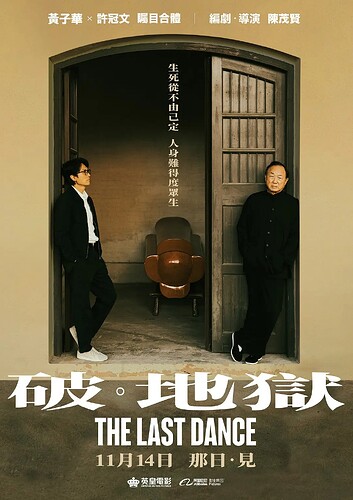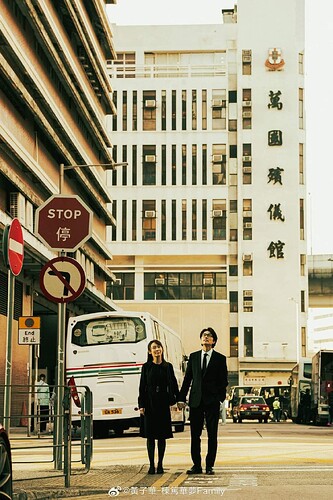I was all of 6 or 7 seven years old when my grandfather passed away. Scenes of that chaotic day still remain vivid in my mind. I can’t remember whose bright idea it was to make me go to his death bed (my grandparents lived one door away on the same floor as me) to see him in his final state of repose. Maybe I was too young to understand death, but I don’t remember I was scared. Then there was the Taoism funeral which was a complete eye-opener to me. I remember being fascinated by all the paper house, car, servants, and the huge racket made by the Taoist priests every night. The incessant clanging of cymbals can wake the dead, maybe that’s the purpose. Growing up, I learned there are a few professions that will never go out of fashion. Morbid subject aside, working in the funeral business is an iron rice bowl.
Funerals depicted in cinema are seldom done with much depth. I mean who wants to put the idea of funerals front and centre? Doesn’t that spell instant box-office death with such a taboo subject? Fortune favours the brave and writer-director Anselm Chan has done just that in one of the year’s most life-affirming film. The irony hits like a thunderclap – it takes a movie about death to demonstrate how beautiful life can be. As I type this, the movie is in second place of Hong Kong’s list of all time top grossing domestic films and I won’t be surprised it will surpass the top film, A Guilty Conscience (2023) in no time.
The story follows Dominic (Dayo Wong) whose wedding planning business went up in smoke because of the pandemic and economic downturn. He is buried underneath a mountain of debt until his girlfriend Jade (Catherine Chau) shares with him that her uncle Ming (Paul Chun Pui) is retiring from the funeral business and wants somebody to take over him. It is hardly Dominic’s forte but since nothing is worse than poverty according to him he takes over the business. He is warned that he has to deal with the other partner, Master Man Kwok (Michael Hui), a Taoist priest who is a stickler of arcane rules and traditions.
We also learn about Man’s fractured family which consists of his son Ben (Chu Pak-Hong) who is married. His wife and son are Catholics because she wants the son to enrol in a prestigious Catholic school, while Ben is tasked with taking over the family’s business eventually. There is also an emotionally estranged daughter Yuet (a superb Michelle Wai), a paramedic who has to put up with her father’s misogynistic remark that “women are filthy” because of his ancestral belief.
The movie gets out of its block as an odd couple story and what a coup it is in getting two comedy heavyweights to play both pivotal roles. Both gave nuanced portrayals, never allowing their well-honed comedic histrionics to overwhelm any scene. It isn’t difficult to see Man and Dominic as personifications of tradition and modernity respectively, both circling around each other in discrete orbits. Gradually, through circumstances and with both letting down their guard their orbits start to intersect.
Both character arcs are superbly drawn and I would be hard pressed to decide which arc is the best. Dominic gradually learning the true meaning of empathy in a business in which empathy comes as fake as plastic flowers is particularly heartrending. Then there is Man, a cantankerous curmudgeon who feels he is the last man standing in a fast changing world which has no room for arcane traditional practices. Both characters’ interactions are well-written and you can feel the weight of their words as both of them learn to see from each other’s point of view. Man at first sees both of them as handling two separate aspects of the funeral process – Man handles the afterlife of the dead by performing the Breaking Hell’s Gate ritual which allows the soul of the deceased to transcend 9 levels of hell in order to gain reincarnation, while Dominic sees to the needs of grieving bereaved. In one particular poignant conversation, Dominic shares the living also has their own hell and there are overlaps in what they do.
The screenplay is not content with just focusing on the two main characters’ arcs and drops numerous sub-plots including poignant stories of the deceased with strong Departures (2008) vibes albeit with a more Hong Kong-centric focus. At one point I thought a 2-hour runtime is not going to deal with every aspect satisfactorily, but the movie passed with flying colours. Every sub-plot is so well-drawn that you won’t even notice they are actually feeding the main narrative thread. The standout from all the sub-plots has to be Yuet’s story with Michelle Wai in a superb turn as the long-suffering daughter who longs for her father’s love and respect. Through her moving arc we understand why it is always the hardest to seek forgiveness from a loved one and the pain from navigating rigid societal norms. The culmination of her arc serves as the climax of the movie and I pray you have a tissue in your hand at this point. As it turned out The Last Dance is also a female empowerment story and it is a superb one at that.
I was in a warm cocoon with my heart gently swelling, waiting for the series of emotional earthquakes that will lead to an explosion of the feels and then the story over-reaches with a new sub-plot bomb early in the last act. This concerns Dominic’s Jade which I had forgotten about. Have you seen movies that are perfect until one careless narrative move that render everything obsolete. I couldn’t believe the director pull this rabbit out of the hat and the movie is fast running out of time to give it an empathic closure. Then it did a magic act that I didn’t see coming – in a final voice-over by Dominic it closes that sub-plot and the entire story in such a resonant manner that it closed the book emphatically. The final metaphor is icing on the cake.
There are movies that make you sit at the edge of your seat, make you scream in horror, make you shed tears, make you punch the air in joy. The Last Dance does something even better – it gives you a gift to see the world in a different light. This is the best film from Hong Kong I have seen in years and it has the grace and power to resonate with anyone no matter your station, creed or race. This is also one of the best films I have the privilege to see this year too. I actually saw this in its native language of Cantonese and I am of the strenuous belief that this dance should be experienced this way. Make a trip to Malaysia before the run is over.
5 / 5
My review is done, but at this point I want to include the final metaphor verbatim. Needless to say this is spoiler territory and I would encourage you not to read on. One selfish reason I write reviews is that I wrote it for myself, so I can read them again and remember the story. I have a feeling down the road when going to the cinema is going to be difficult I will still have the words, my words, to comfort me. This is the metaphor:
“人生就好像一程車,重點不是上車的人可以陪你去到哪個站,而是你們一起欣賞過哪些風景。有機會來到這個世界已經賺了,何必介懷什麼時候下車,不如好好欣賞沿途的風景。”
Life is a bus ride. The most important thing isn’t who accompanies you on this journey or the destination itself. Rather than focusing on when to alight, why not spend the time enjoying the marvellous scenery with the passengers. Perhaps getting on this bus is a bonus itself and the length of the journey isn’t important.
Dayo Wong (黃子華) and Catherine Chau (周家怡) walking in Hung Hom, with the International Funeral Parlour (萬國殯儀館) in the background


